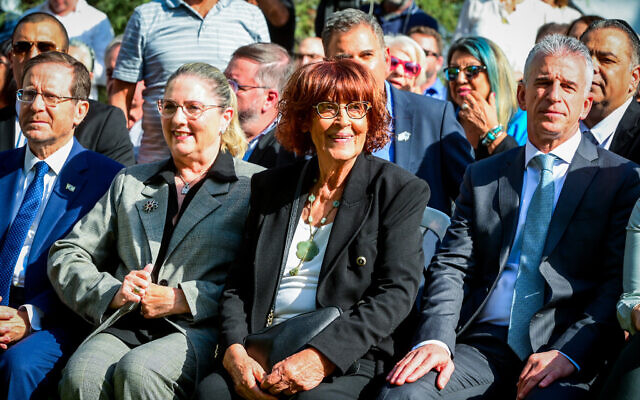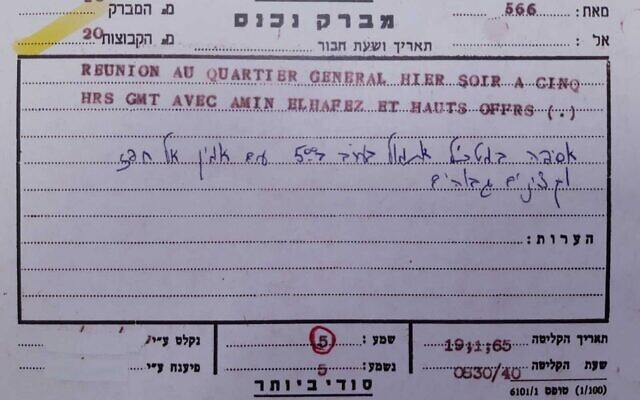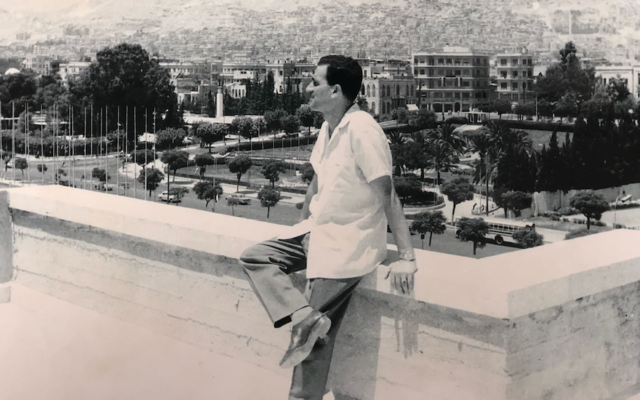Spy’s final message
Inaugurating museum named for legendary secret agent, Barnea says Cohen was caught because his cables were ‘intercepted and triangulated,’ not because he transmitted too frequently.
Mossad chief David Barnea revealed the last message sent out by legendary Israeli spy Eli Cohen on the day of his capture in Syria, along with new information on what led to his arrest.
Amid years of dispute over the circumstances of Cohen’s cover being blown — it has been alleged that he transmitted too often, or was pressured by his handlers — Barnea said new “in-depth” research had definitively established that Cohen was captured “simply because his transmissions were intercepted and triangulated by the enemy.”
“Eli Cohen was among our best agents,” Barnea said at an event marking the inauguration of the new Eli Cohen Museum in Herzliya.
Barnea praised Cohen’s “fighting spirit, courage, values and devotion” and said he serves as “a source of inspiration” for all Mossad personnel.
“We all learn from him, even today, from his Zionism, his sacrifice and his dedication.”
Cohen infiltrated the top echelons of Syria’s political leadership in the years leading up to the 1967 Six Day War. The information he obtained is believed to have played a key role in Israel’s overwhelming success in that war.
He was caught in 1965 and hanged in Damascus. But the circumstances surrounding his capture have since been disputed and are a source of an ongoing debate. Some have argued that Cohen failed to follow procedures and had attempted to send out too many messages, which drew the Syrians’ attention. Others have blamed Cohen’s superiors, saying he had been put under immense pressure to provide new information, which led to his capture.
Nearly 60 years later, Barnea provided an answer, albeit a vague one.

“I will honour this holy place and reveal, for the first time, following in-depth research that was carried out recently, that Eli Cohen was not captured due to the quantity of his transmissions or pressure from headquarters to transmit too frequently,” he said.
“Eli Cohen was captured simply because his transmissions were intercepted and triangulated by the enemy,” Barnea said. “This is now an intelligence fact.”
He also revealed the content of Cohen’s last transmission, received on January 19, 1965, the day he was captured.

Cohen’s last report was “about a discussion at the Syrian General Staff with the participation of then-president Amin Al-Hafez,” Barnea said.
He said the Mossad would donate the original document containing Cohen’s transmission to the new museum established in his memory.
Barnea praised Cohen’s “contribution to the security of Israel” and said Israel’s national intelligence agency would continue to seek more information about the time Cohen spent in Syria.
He also vowed to continue the search for Cohen’s remains.
In February 2021, it was reported that Russia, in cooperation with Syrian authorities and under Israeli pressure, was searching the area of the Yarmouk refugee camp in southern Damascus for Cohen’s body in order to transfer it to Israel.
The following month, an object believed to have belonged to Cohen was reportedly transferred to Israel. Quoting an unnamed Syrian government source, Israeli reports said at the time that the item could be a document or an article of Cohen’s clothing.
Then-prime minister Benjamin Netanyahu’s office denied the reports and it remains unknown whether such an object actually existed.
Times of Israel


comments